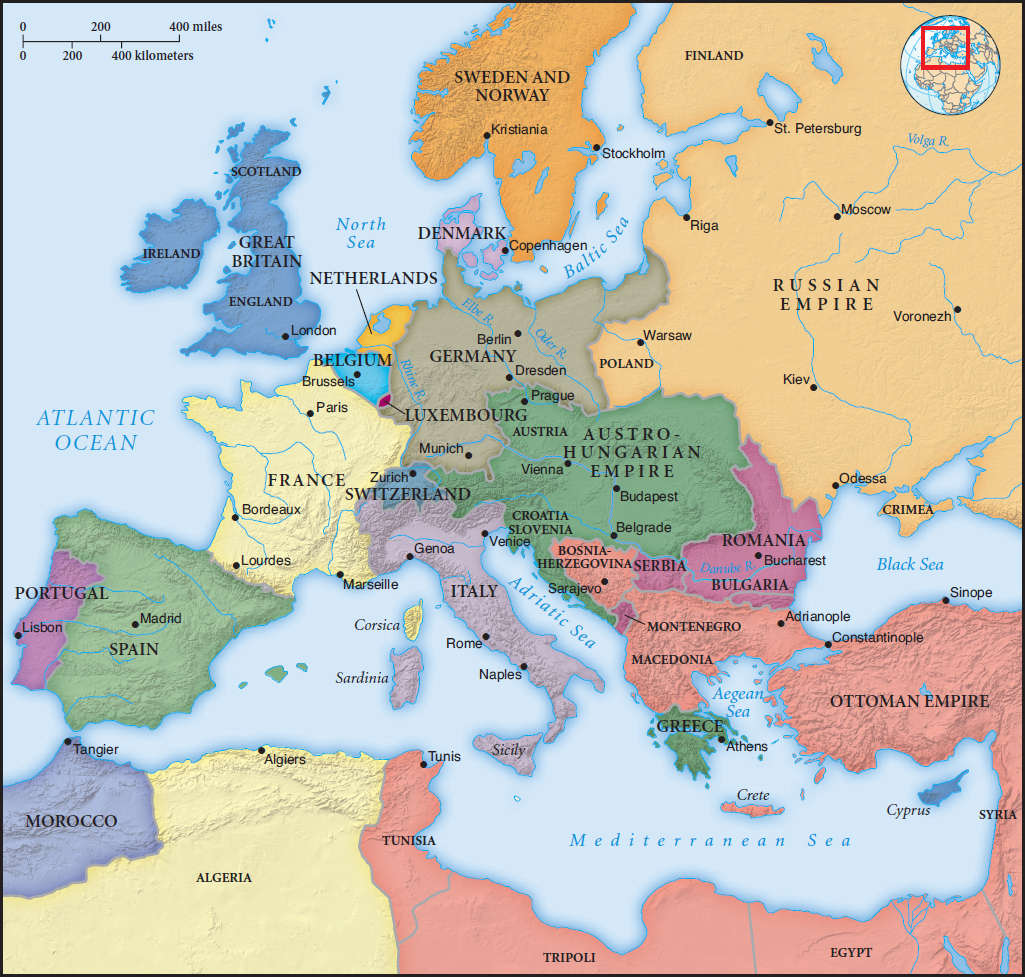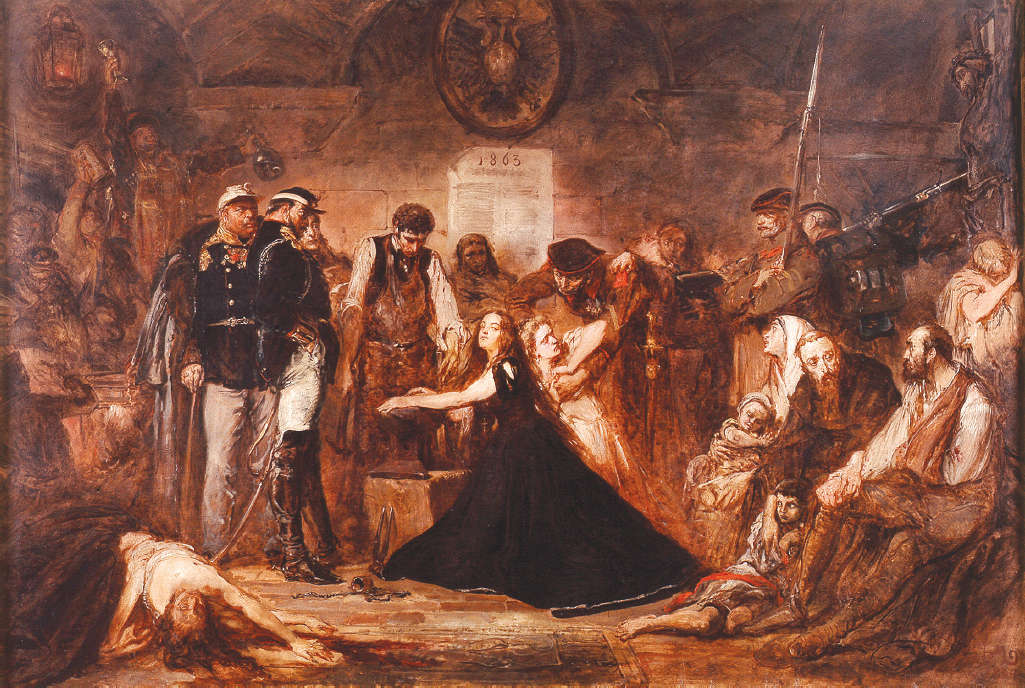Nations and Nationalism
Explanation
Question
What accounts for the growth of nationalism as a powerful political and personal identity in the nineteenth century?
[Answer Question]
In addition to contributing to the end of slavery, the Atlantic revolutions also gave new prominence to a relatively recent kind of human community—the nation. By the end of the twentieth century, the idea that humankind was divided into separate nations, each with a distinct culture and territory and deserving an independent political life, was so widespread as to seem natural and timeless. And yet for most of human experience, states did not usually coincide with the culture of a particular people, for all of the great empires and many smaller states governed culturally diverse societies. Few people considered rule by foreigners itself a terrible offense because the most important identities and loyalties were local, limited to clan, village, or region, with only modest connection to the larger state or empire that governed them. People might on occasion consider themselves part of larger religious communities (such as Christians or Muslims) or ethnolinguistic groupings such as Greek, Arab, or Mayan, but such identities rarely provided the basis for enduring states.
All of that began to change during the era of Atlantic revolutions. Independence movements in both North and South America were made in the name of new nations. The French Revolution declared that sovereignty lay with “the people,” and its leaders mobilized this people to defend the “French nation” against its external enemies. In 1793, the revolutionary government of France declared a mass conscription (levée en masse) with a stirring call to service:
Henceforth, until the enemies have been driven from the territory of the Republic, all the French are in permanent requisition for army service. The young men shall go to battle; the married men shall forge arms and transport provisions; the women shall make tents and clothes, and shall serve in the hospitals; the children shall turn old linen into lint; the old men shall repair to the public places, to stimulate the courage of the warriors and preach the unity of the Republic and the hatred of kings.22
Napoleon’s conquests likewise stimulated national resistance in many parts of Europe. European states had long competed and fought with one another, but increasingly in the nineteenth century, those states were inhabited by people who felt themselves to be citizens of a nation, deeply bound to their fellows by ties of blood, culture, or common experience, not simply common subjects of a ruling dynasty. It was a novel form of political loyalty.
Snapshot Key Moments in the Growth of Nationalism
| 1776–1825 | Independence of colonies in the Americas |
| 1793 | Mass conscription to defend the French Revolution |
| 1800–1815 | Wars of resistance to Napoleonic empire |
| 1830 | Greek independence from Ottoman Empire |
| 1830, 1863 | Polish insurrections against Russian rule |
| 1842 | Young Ireland movement begins |
| 1846 | First Ukrainian nationalist organization established |
| 1848 | Hungarian national uprising against Austrian Habsburg rule |
| 1870, 1871 | Unification of Italy and Germany |
| 1880 | Egyptian revolt against British and French imperialism |
| 1885 | Founding of Indian National Congress |
| 1890s | Political Zionism emerges, seeking a homeland in Palestine for Jews |
Europe’s modern transformation also facilitated nationalism, as older identities and loyalties eroded. Science weakened the hold of religion on some. Migration to industrial cities or abroad diminished allegiance to local communities. At the same time, printing and the publishing industry standardized a variety of dialects into a smaller number of European languages, a process that allowed a growing reading public to think of themselves as members of a common linguistic group or nation. All of this encouraged political and cultural leaders to articulate an appealing idea of their particular nations and ensured a growing circle of people receptive to such ideas. Thus the idea of the “nation” was constructed or even invented, but it was often imagined and presented as a reawakening of older linguistic or cultural identities, and it certainly drew on the songs, dances, folktales, historical experiences, and collective memories of earlier cultures (see Map 16.4).

Whatever its precise origins, nationalism proved to be an infinitely flexible and enormously powerful idea in nineteenth-century Europe and beyond. It inspired the political unification of both Germany and Italy, gathering their previously fragmented peoples into new states by 1871. It encouraged Greeks and Serbs to assert their independence from the Ottoman Empire; Czechs and Hungarians to demand more autonomy within the Austrian Empire; Poles and Ukrainians to become more aware of their oppression within the Russian Empire; and the Irish to seek “home rule” and separation from Great Britain. By the end of the nineteenth century, a small Zionist movement, seeking a homeland in Palestine, had emerged among Europe’s frequently persecuted Jews. Popular nationalism made the normal rivalry among European states even more acute and fueled a highly competitive drive for colonies in Asia and Africa. The immensity of the suffering and sacrifice that nationalism generated in Europe was vividly disclosed during the horrors of World War I.
Governments throughout the Western world claimed now to act on behalf of their nations and deliberately sought to instill national loyalties in their citizens through schools, public rituals, the mass media, and military service. Russian authorities, for example, imposed the use of the Russian language, even in parts of the country where it was not widely spoken. They succeeded, however, only in producing a greater awareness of Ukrainian, Polish, and Finnish nationalism.

As it became more prominent in the nineteenth century, nationalism took on a variety of political ideologies. Some supporters of liberal democracy and representative government, as in France or the United States, saw nationalism, with its emphasis on “the people,” as an aid to their aspirations toward wider involvement in political life. Often called “civic nationalism,” such a view identified the nation with a particular territory and maintained that people of various cultural backgrounds could assimilate into the dominant culture, as in the process of “becoming American.” Other versions of nationalism, in Germany for example, sometimes defined the nation in racial terms, which excluded those who did not share a common ancestry, such as Jews. In the hands of conservatives, nationalism could be used to combat socialism and feminism, for those movements only divided the nation along class or gender lines. Thus nationalism generated endless controversy because it provided no clear answer to the questions of who belonged to the nation or who should speak for it.
Nor was nationalism limited to the Euro-American world in the nineteenth century. An “Egypt for the Egyptians” movement arose in the 1870s as British and French intervention in Egyptian affairs deepened. When Japan likewise confronted European aggression in the second half of the nineteenth century, its long sense of itself as a distinct culture was readily transformed into an assertive modern nationalism. Small groups of Western-educated men in British-ruled India began to think of their enormously diverse country as a single nation. The Indian National Congress, established in 1885, gave expression to this idea. The notion of the Ottoman Empire as a Turkish national state rather than a Muslim or dynastic empire took hold among a few people. By the end of the nineteenth century, some Chinese intellectuals began to think in terms of a Chinese nation beset both by a foreign ruling dynasty and by predatory Europeans. Along the West African coast, the idea of an “African nation” stirred among a handful of freed slaves and missionary-educated men. Although Egyptian and Japanese nationalism gained broad support, elsewhere in Asia and Africa such movements would have to wait until the twentieth century, when they exploded with enormous power on the stage of world history.